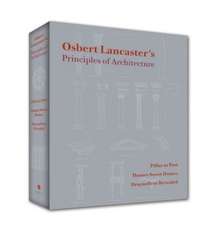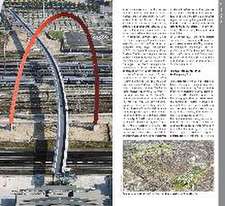Gropius, W: International Architecture
en Limba Engleză Hardback – 20 feb 2019
When the Bauhaus moved to Dessau in 1924, it was finally possible to publish the first of the Bauhausbcher that Walter Gropius (1883-1969) and Lszl Moholy-Nagy (1895-1946) had first conceived of in Weimar. The series was intended to give insight into the teachings of the Bauhaus and the possibilities it offered for incorporating modern design into everyday aspects of an ever-more-modern world.
First in the series was Gropius' International Architecture, an overview of the modern architecture of the mid-1920s and an early attempt to articulate what would come to be known as International Style architecture. In a brief preface, Gropius summarized the guiding principles he identified uniting the avant-garde around the world. But the real thrust of the book is visual, with an extensive illustrated section showing buildings in Europe and the Americas. According to Gropius, these illustrations show the "development of a consistent worldview" that dispensed with the prior decorative role of architecture and expressed itself in a new language of exactitude, functionality and geometry. Published for the first time in English, this new edition of the first of the Bauhausbcher is accompanied by a brief scholarly commentary. Presented in a design true to Moholy-Nagy's original, International Architecture offers readers the opportunity to explore the Bauhaus' aesthetic and its place in the world as Gropius himself was trying to define them.Preț: 203.74 lei
Preț vechi: 270.98 lei
-25% Nou
Puncte Express: 306
Preț estimativ în valută:
38.100€ • 42.37$ • 32.78£
38.100€ • 42.37$ • 32.78£
Carte disponibilă
Livrare economică 31 martie-07 aprilie
Preluare comenzi: 021 569.72.76
Specificații
ISBN-13: 9783037785843
ISBN-10: 3037785845
Pagini: 108
Dimensiuni: 186 x 236 x 12 mm
Greutate: 0.43 kg
Editura: Lars Müller Publishers
ISBN-10: 3037785845
Pagini: 108
Dimensiuni: 186 x 236 x 12 mm
Greutate: 0.43 kg
Editura: Lars Müller Publishers
Descriere
This first English translation of Volume 1 of the Bauhausbucher allows the reader to broaden his or her view of German architectural history by placing the achievements of the Bauhaus in an international context and by documenting and capturing its philosophy of reform.

















